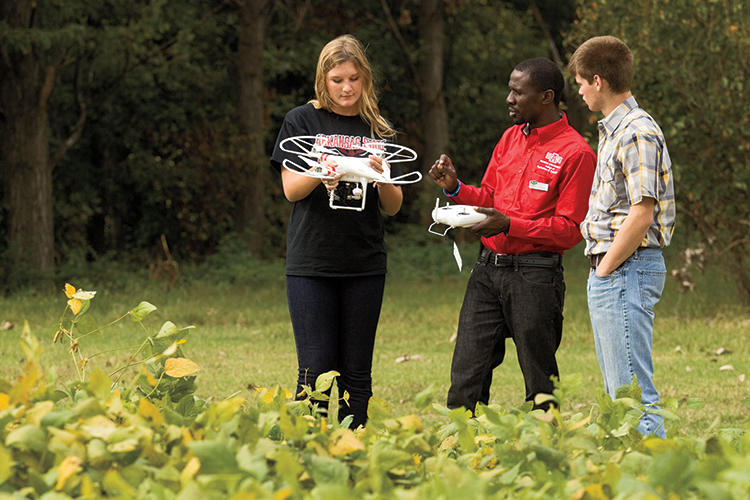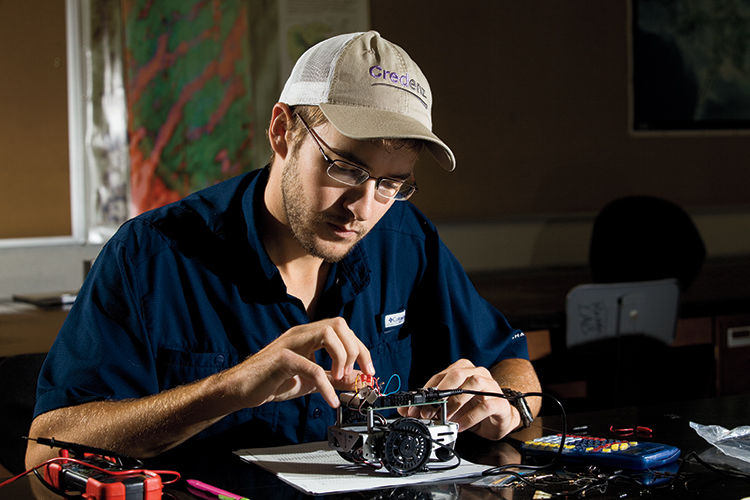Home > Arkansas > Arkansas Technology > High-Tech Agriculture in Arkansas
High-Tech Agriculture in Arkansas

Just 10 short years ago, when guided systems technology first allowed tractors to virtually drive themselves, it seemed like something out of a Sci-Fi novel. Today, that’s old news, as sophisticated farm equipment – guided by global positioning systems – tracks everything from diagnostic health to harvest data, communicating wirelessly back to the farm office.
Modern agriculture provides producers and processors with not only better resources and more potential than ever before, but it also creates a demand for people who can interpret data and utilize the ever-evolving technology.
“Technology is not only changing at a rapid pace in our everyday life, it’s changing how we do business out here on the farm,” says Marshall Stewart, president of Greenway Equipment. “Technology is going to have more emphasis in our industry. One of the biggest challenges is getting qualified help in any sector of agriculture.”
To that end, Greenway stepped up to provide scholarships supporting a brand new concentration at Arkansas State University called Agricultural Systems Technology.
This new concentration is based in the Agricultural Studies degree program and includes a 120-credit-hour curriculum that provides the core agriculture courses, plus 21 hours of geospatial and precision agriculture classes and 15 hours of technology coursework.

“According to the 2012 Census of Agriculture, the average age of the principle farm operator is 58.3. This creates a tremendous need for graduates with the technological skills necessary to address the complex machinery and application systems being used in today’s agriculture,” says Dr. Timothy Burcham, dean of the College of Agriculture and Technology, who worked with university instructors to develop the new curriculum. The college also hired Dr. Peter Larbi, who holds a Ph.D in Agricultural and Biological Engineering, and has a background in precision agriculture. He joins associate professor, Dr. Keith Morris, who teaches agriculture and spatial technologies courses.
“The Agricultural Systems Technology concentration provides a skill set that is in high demand today from a wide range of employers,” says Burcham. “It will provide excellent employment opportunities, not only in our region, but more importantly throughout the state, the nation and the world.”
Potential employers for graduates with this concentration include agricultural machinery manufacturers and dealers, crop input and protection companies, geospatial technology groups, precision agriculture companies, and local, state and federal positions requiring a technological knowledge base.
“We’re looking to hire future leaders,” says Rick Bormann, senior vice president of Greenway. “With ASU right in our backyard, we should be able to partner with them to develop the type of individual that we’re looking for. We’re trying to more or less grow our own, if you will, in terms of producing a product that we know will come back and be a valuable member of our management team.”
Mary Liz Klueppel is one of the lucky scholarship recipients, which is partially why she chose Arkansas State University. She initially wanted to major in Agribusiness, but when she heard about the new concentration she changed her plans immediately.
“I am most looking forward to learning the technology side of agriculture, because that is something changing every day,” Klueppel says. “I want to know and learn it all. I want to be able to counsel farmers about new technology and any problems they might be having with it. I think this is a very promising field.”
![Ag Technology [INFOGRAPHIC]](https://eadn-wc01-4177395.nxedge.io/wp-content/uploads/2020/05/Screen-Shot-2015-03-03-at-4.23.55-PM.png)



